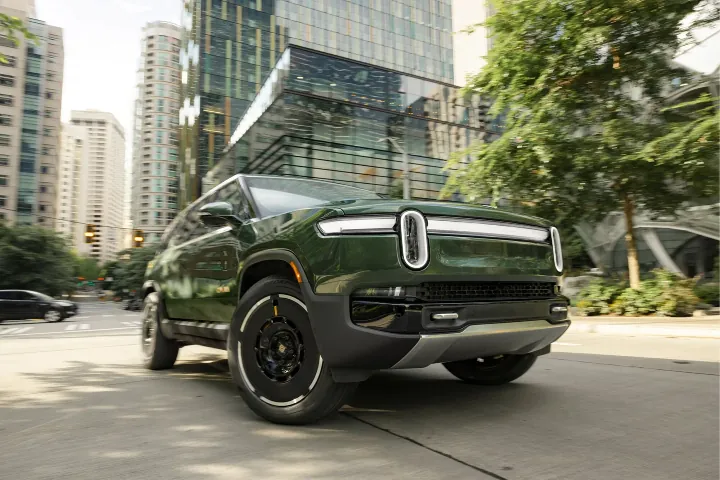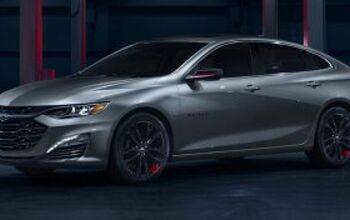Rivian Is Now In the Used EV Business

For a long time after their releases, buyers faced extended wait times for the Rivian R1S SUV and R1T pickup. While that situation has largely become a nonissue as the automaker has scaled production and early enthusiasm subsided, Rivian will soon offer buyers another purchasing option that could bring lower prices and much faster delivery times.
Rivian recently announced a new pre-owned vehicle program for its two current EV offerings, which will help its bottom line and could mean better deals for customers. The automaker said that the program “will expand R1 ownership and make owning a Rivian accessible to more people.”
Industry observers believe Rivian’s pre-owned program is a smart move. Edmunds senior analyst Ivan Drury said, “It’s almost mandatory if you want to be taken seriously. For consumers testing the waters on brands they’ve never had experience with, you want as many things as possible that inspire confidence, and these programs speak to that.”
That said, Drury also believes the program will become popular with buyers. EVs depreciate faster than gas and hybrid vehicles, and letting the first owner eat those costs can mean big savings on used models. He said that prospective EV buyers should only be considering leasing a new vehicle or purchasing a used one.
“No one should be purchasing a new EV unless they have absurd levels of disposable income,” he noted.
Rivian’s pre-owned program is similar to Tesla’s in that buyers have a range of vehicles to choose from, and the company delivers them directly to them as it does with new models. All pre-owned vehicles “undergo a comprehensive inspection before becoming available for sale and are priced according to their mileage and condition,” Rivian noted, though it avoids using the term “certified” to describe them.
[Images: Rivian]
Become a TTAC insider. Get the latest news, features, TTAC takes, and everything else that gets to the truth about cars first by subscribing to our newsletter.

Chris grew up in, under, and around cars, but took the long way around to becoming an automotive writer. After a career in technology consulting and a trip through business school, Chris began writing about the automotive industry as a way to reconnect with his passion and get behind the wheel of a new car every week. He focuses on taking complex industry stories and making them digestible by any reader. Just don’t expect him to stay away from high-mileage Porsches.
More by Chris Teague
Latest Car Reviews
Read moreLatest Product Reviews
Read moreRecent Comments
- EBFlex Garbage but for less!
- FreedMike I actually had a deal in place for a PHEV - a Mazda CX-90 - but it turned out to be too big to fit comfortably in my garage, thus making too difficult to charge, so I passed. But from that, I learned the Truth About PHEVs - they're a VERY niche product, and probably always be, because their use case is rather nebulous. Yes, you can run on EV power for 25-30 miles, plug it in at home on a slow charger, and the next day, you're ready to go again. Great in theory, but in practice, a) you still need a home charger, b) you paid a LOT more for the car than you would have for a standard hybrid, and c) you discover the nasty secret of PHEVs, which is that when they're on battery power, they're absolute pigs to drive. Meanwhile, to maintain its' piglike battery-only performance, it still needs to be charged, so you're running into all the (overstated) challenges that BEV owners have, with none of the performance that BEV owners like. To quote King George in "Hamilton": " Awesome. Wow." In the Mazda's case, the PHEV tech was used as a performance enhancer - which worked VERY nicely - but it's the only performance-oriented PHEV out there that doesn't have a Mercedes-level pricetag. So who's the ideal owner here? Far as I can tell, it's someone who doesn't mind doing his 25 mile daily commute in a car that's slow as f*ck, but also wants to take the car on long road trips that would be inconvenient in a BEV. Meanwhile, the MPG Uber Alles buyers are VERY cost conscious - thus the MPG Uber Alles thing - and won't be enthusiastic about spending thousands more to get similar mileage to a standard hybrid. That's why the Volt failed. The tech is great for a narrow slice of buyers, but I think the real star of the PHEV revival show is the same tax credits that many BEVs get.
- RHD The speed limit was raised from 62.1 MPH to 68.3 MPH. It's a slight difference which will, more than anything, lower the fines for the guy caught going 140 KPH.
- Msquare The argument for unlimited autobahns has historically been that lane discipline is a life-or-death thing instead of a suggestion. That and marketing cars designed for autobahn speeds gives German automakers an advantage even in places where you can't hope to reach such speeds. Not just because of enforcement, but because of road conditions. An old Honda commercial voiced by Burgess Meredith had an Accord going 110 mph. Burgess said, "At 110 miles per hour, we have found the Accord to be quiet and comfortable. At half that speed, you may find it to be twice as quiet and comfortable." That has sold Mercedes, BMW's and even Volkswagens for decades. The Green Party has been pushing for decades for a 100 km/h blanket limit for environmental reasons, with zero success.
- Varezhka The upcoming mild-hybrid version (aka 500 Ibrida) can't come soon enough. Since the new 500e is based on the old Alfa Mito and Opel Adam platform (now renamed STLA City) you'd have thought they've developed the gas version together.




































Comments
Join the conversation